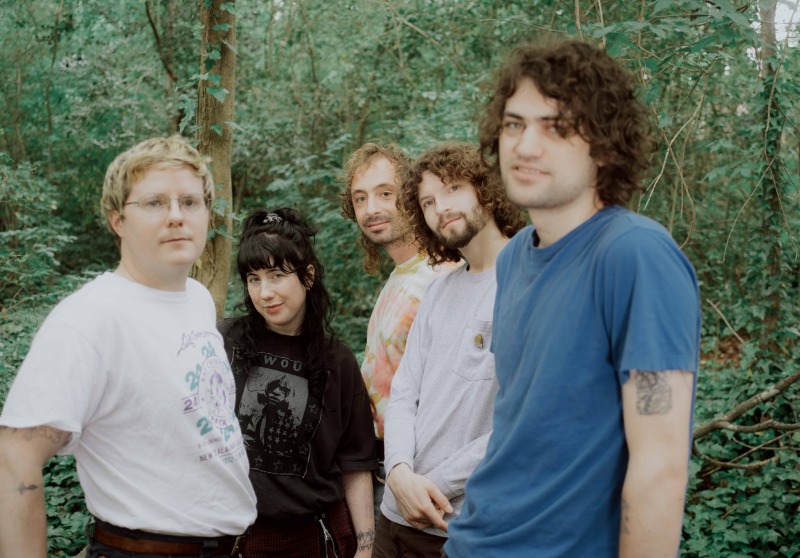COVER STORY | Wednesday Rejoice In Their Sicko Acrobatics
Karly Hartzman speaks with Paste about leaving Haw Creek, chasing the tones of Dolly Parton and Dinosaur Jr., songwriting as archeology, and her band’s brilliant new record, Bleeds.
Photos by Graham Tolbert
The last time I saw Karly Hartzman, it was on the Ace of Cups stage in Columbus, Ohio two years ago. The summer had rotted through and a sellout crowd spilled into the college town rumbling outside. Wednesday were plum tired, bowled over and worn thin by a nearly-over tour in the afterglow of Rat Saw God’s critical acclaim. They told the audience as much, but Hartzman, on life-support yet chuffed by a pack of rowdy frat boys getting entangled in low-swinging string lights while attempting to crowdsurf, still toiled through a rendition of “Bull Believer” that kicked the thumbtacks out of the wall. The quintet soon returned to Asheville to play a hometown show at the Orange Peel, but afterwards, there was no comedown. Just more bookings. “There was always something happening next,” Hartzman recalls. “I would get home and just work and work and work.”
At home, she wrote music and kept up with her sewing projects. But rest was off the table. “I felt like I couldn’t. Finally, this year, I’ve had significant time off. I feel like a normal human being again, but it took a long time to recover from that album cycle.” In 2023, Wednesday played over one-hundred sets. They’ll never do that again, and they’ve set “new standards of how much time we spend [on the road] and how many shows we do in a row” to make sure of it. By the time the Rat Saw God hype—which got so big it allowed her and her bandmates to quit their food service and retail jobs—thinned out, Hartzman had the bulk of her band’s sixth LP, Bleeds, written. She never sits down and plots out a record, preferring the stasis of gigging and idea-dumping until she reaches a “bookend in my life, thematically or whatever.” “I just say, ‘Okay, that’s the album.’ And then we record. And then the next one.”
Hartzman recently relocated to her hometown, Greensboro. In fact, most of Wednesday has left Asheville completely. The band’s old haunt, a multi-acre strip of land owned by the late Gary King called Haw Creek, is still greatly adrift, alive plainly in Colin Miller’s fabulously somber album Losin’ and, too, during the conclusive piece of Bleeds, the aptly-titled “Gary’s II,” a successor to the Twin Plagues closer, “Gary’s.” This time around, Hartzman sings about a bar fight and gestures toward Gary’s mountain mouth, hollering about “teeth [that] had leapt from you so you spit ‘em all out” and cheekily relishing the moment she found out he had false ones. I ask Hartzman what brought her back to Gary. “He had a million stories, and I just wanted an opportunity to tell another one,” she says. “Asheville is turning into such a different place, as places do, and a lot of people are retiring. There’s a lot of people with money. It’s a tourist town. But when Gary grew up there, it was a mountain town. I wanted to preserve one of those stories, if possible. That’s one of the things that would have been lost if it hadn’t been said about him. We were there to hear him, and I want to pass him on.”
She thinks about Haw Creek a lot, mourning the three-hundred-and-seventy-five dollars a month it cost her to live there, the quarter-mile walk to the mailbox, and the now-departed Gary. But she remembers the acre or two of grass that always sat before her home, and how Gary would let it grow up to three or four feet high so it could blow in the wind. Then, when it got too tall, he’d break out a “big, weed-whacker-type thing,” cut it all down, and roll the grass into bales of hay. “It was a good way to organize time, rather than thinking of time day by day,” Hartzman admits. “You’re just watching the grass grow and be cut. It feels like a more organic way to separate the parts of your life. I miss that.” She lived with her bandmate and then-partner, Jake “MJ” Lenderman, and her other bandmates were never too far away. It was encouraging, having creative people with common interests all living in one place together. In Greensboro, she lives alone and doesn’t hang out with too many musicians. “When you only hang out with musicians, you can fool yourself into thinking that’s the only type of person on the earth. And that’s actually not the best way to think, because there’s so much other stuff happening that is nice to be plugged into.” A cool thing about Hartzman’s new home? “I can go on a walk,” she says. “I couldn’t go on a walk in Asheville, because we lived on a mountain road where there were no sidewalks.”
Of course, she’s always going to write about the South, too, even if her bandmates goof on her for how obvious a choice that may be. “That’s what Wednesday is about. That’ll always be there, because that’s a deep part of me.” And, in an era where country music is as popular as it’s ever been, artists across the entire Western Hemisphere are borrowing from the South, incorporating the fashion and aesthetics of the region into their image. Hartzman feels neutral about it, as she’s witnessed the transformation firsthand while touring. “A bunch of people in Brooklyn are wearing camo and Carhartt,” she laughs, after checking to make sure I don’t live in New York City. “The first tour we did in 2018, we rolled up wearing all that stuff and we stuck out like a sore thumb. I remember being on the train with Jake in his trucker hat and Carhartt [jacket] and being like, ‘We do not look like we belong here at all,’ and I felt really uncomfortable.”
She recalls seeing a map of potential Iran retaliation sites in the United States online recently and wading through the public’s reactionary calls to “shift it to all of the Trump-voting red states.” “There’s that swath of people that still boil this area down to that,” she clarifies. “But I know a lot of queer and minority people that are from the South and feel really uncomfortable [in New York].” Recent albums, like Losin’, Fust’s Big Ugly, Jason Isbell’s Foxes in the Snow, and Ryan Davis & The Roadhouse Band’s New Threats From the Soul (if you consider Louisville to be in the South) are doing a good job extracting the stigma around the South without oversaturating the romantic currency of its geography. “There is so much to love,” Hartzman argues. “There’s a lot of layers, like an onion, to quote Shrek. One of my favorite compliments I could get from a person in that demographic is that the music reframes that feeling of complete shame about this area.”
THE BLEEDS ALBUM CYCLE began in May with “Elderberry Wine,” a much quieter, more melodic choice compared to what kicked off the Rat Saw God momentum, “Bull Believer.” The decision got people talking online, some hoping the new record would still yield some heavy shit. “Elderberry Wine” (not an Elton John reference, sadly) was picked first because, aside from it being Hartzman’s parents’ favorite song on the album, it was a “slight” attempt to transition from Lenderman’s last solo release, the breakout indie hit Manning Fireworks. “People really resonated with [that record], and, strategically, we were trying to capitalize on that,” Hartzman says. “That’s not the most artistic answer but, realistically, with each new MJ or Wednesday album that comes out, we work in tandem and share an audience.” Haltingly, she reveals the obvious: “Plus, I wanted that song to be out for the majority of the summer, for people to bump.” Fans would get their wish eventually, as the stormy, overdriven “Wound Up Here (By Holdin’ On)” and the atonal, Dinosaur Jr.-craving “Pick Up That Knife” were released back-to-back.
“Pick Up That Knife,” like “Bitter Everyday,” “Phish Pepsi,” “Elderberry Wine,” and “Townies,” displays Bleeds’ not-so-secret-anymore weapon: Xandy fucking Chelmis. Some of his pedal steel phrases on this album are just unbelievable, and I tell Hartzman as much. “Bro,” she deadpans, “everything he does is fucking insane. Jake is irreplaceable as a guitarist, but, literally, if Xandy was not in this band, Wednesday is over.” She clarifies, “I would write other songs, but they would not be Wednesday songs, because so much of our identity is his playing and what he does with his instrument.” The blast of hissing, pissing, sludgy solos from Hartzman and Lenderman, the lead-footed percussion thwacks from Alan Miller, and Ethan Baechtold’s threaded bass notes in “Wound Up Here” were Chelmis’ idea. “He just threw that out casually,” Hartzman remembers. “It’s infuriating. Like, how do you just know to go off like this? At first, you’re like, ‘This sounds fucking crazy, insane, stupid.’ And then he does it, and you’re like, ‘You motherfucker.’”
Chelmis doesn’t like “Bitter Everyday,” Hartzman reveals, because he doesn’t “feel like he got his part really right.” She listened to the song and, verbatim, told him, “You did the perfect thing, you little bitch.” Considering that Twin Plagues was Chelmis’ first honest pursuit of his instrument, the idioms he’s chasing on Bleeds are firmly at the mountaintop—lines that wince like the second-coming of Pete Drake, or something. “I think he’s going to be in high demand forever and ever, too, [for session work],” Hartzman gushes, before melting into a whisper. “But the thing is, people are going to know his playing and be like, ‘Is it a good song, or is Xandy just on it?’ Stylistically, his playing has so much personality. It’s so him. I think he’s going to be in history books for the tonal shit.”
But the genius of Wednesday is showcased best by its greatest contrasts, the two-minute ballad “The Way Love Goes” and the even shorter sheet-metal-blasted, hardcore blast of “Wasp.” Hartzman wrote the former while fighting for her deteriorating relationship with Lenderman. “By the time I recorded it, we were broken up,” she says. “And by the time we’re releasing it, my life will be completely different. I don’t really see Jake that often. I’m in a completely different place.” The song, which features an interpolation of a sorta-same-named Johnny Rodriguez tune, carries with it the best lyric on Bleeds, when Hartzman sings, “I’m scared to death there’s women less spoiled by your knowing.” I ask her about that line, to which she responds by saying, “As I’m getting older,” before chuckling and clarifying that she’s twenty-eight years old. “As a woman in an industry where you’re being seen as you age, your stock goes further and further down for a lot of people. I’m going to be starting to confront that a lot. But that’s crazy for me to say before I’m thirty. But it’s a reality! It’s always been therapeutic though. I’d be writing regardless of where my career was, whether it was sustaining me or not, just because of how much I need it.”
-

-

-

-

-

-

-

-

-

-

-

-

-

-

-

-

-

-

-

-

-

-

-

-

-

-

-

-

-

-

-

-

-

-

-

-

-

-

-

-









































